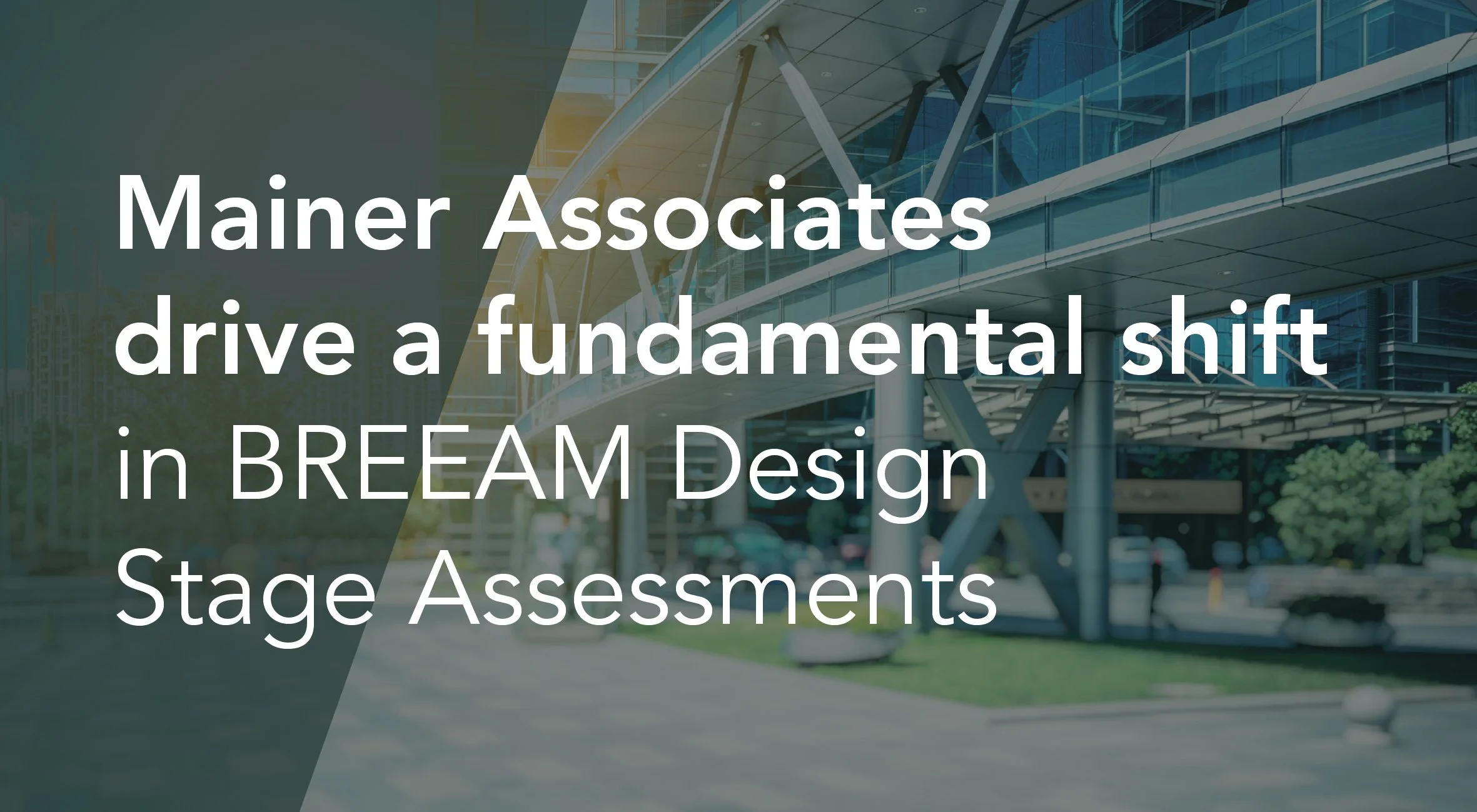
News
Mainer Associates drive a fundamental shift in BREEAM Design Stage Assessments
Mainer have successfully driven a landmark reform in how BREEAM Design Stage Assessments are undertaken. Their expertise and advocacy have culminated in the acknowledgement of the importance of the strategy tabled by Mainer, with the release of BREEAM Guidance Note 55: Contractual Clauses, fundamentally reshaping the way evidence is produced and verified during the design and procurement phases.
Turning Data into Decarbonisation: How Real-Time Insights Are Changing Construction
In an industry long plagued by fragmented data, delayed decisions and missed opportunities, Mainer Associates wanted to create a new tool designed to shift the entire dynamic of carbon management. Enter CarbonCentric - a field-proven, consultant-designed app solution, built to bring real-time management of up-front carbon into the heart of construction and built-environment delivery.
Sustainable Residential Development in the UK: Navigating Policy, Performance and Practice
Sustainable housing in the UK is no longer a fringe ambition or optional upgrade - it has become central to planning success, investor confidence, and long-term community value. This article explores the key policy frameworks, design imperatives, and project-based innovations shaping the future of housing across the UK.
Whole Life Carbon Assessment is the future of sustainable design
Whole Life Carbon Assessment (WLCA) offers a promising solution. Unlike traditional approaches that focus solely on energy use during a building's operation, WLCA considers the entire lifecycle: from the raw materials used in construction to the emissions generated during operation, maintenance, and even demolition. It provides a full picture view of a building's carbon footprint, and with that, a powerful opportunity to reduce it.
Are You Ready for BREEAM v7?
A new version of the UK’s leading sustainability standard is launching soon, and it’s set to shape the future of how we design, deliver, and operate buildings. BREEAM v7 brings a stronger focus on real-world energy use, whole-life carbon, and clearer evidence requirements, raising the bar for achieving top ratings like Excellent or Outstanding.
New Standard for Net Zero Carbon Buildings in the UK
UK’s NZC Buildings Standard sets new benchmarks for real-world net-zero buildings. Mainer Associates leads the way through pilot projects and innovation
Embedding Sustainability into the Planning System: A Strategic Approach
Sustainability is a key focus in UK planning, with policies requiring energy efficiency, carbon reduction, and circular economy strategies in new developments.
The Role of EPDs in Achieving Net Zero in Construction
Environmental Product Declarations (EPDs) help reduce carbon footprints, meet government regulations, and achieve Net Zero goals in construction.
The importance of verifying your Environmental Product Declaration (EPD)
In today's environmentally conscious market, transparency and credibility are paramount. An EPD serves as a standardized document that communicates the environmental impact of a product throughout its lifecycle. However, the true value of an EPD is realized when it is verified by a reputable third-party organization.
Mainer 2024 - A Review
2024 was a year dominated by elections, the Summer Olympics, followed by (what seemed like) incessant bad weather, before ending with a last-minute $300 billion climate finance deal at COP29. At Mainer Associates we welcomed new faces, new projects, and delivered key objectives for our clients. Here are our 2024 highlights.
From Analysis to Declaration: The LCA-EPD Link Explained
Confusion surrounding the relationship between Life Cycle Assessments (LCAs) and Environmental Product Declarations (EPDs) has grown and resulted in the need for clarification. This article examines that relationship and how EPDs can benefit the environmental credentials of your product.
How can you optimise your upfront carbon emissions?
Only by accurately measuring and recording carbon emissions can the industry work to meet net zero goals to confront this planet-wide challenge and developing and deploying this methodology, is crucial for supporting the built environment sector and the world in their aim to achieve Net Zero emissions by 2050.
Mainer Academy 2024: Our new graduates start their journey to a sustainable future
In 2022, we established the Mainer Academy, a graduate scheme designed to invest in young talent as a vital component of a sustainable future. In this article, we are pleased to introduce our recent graduates and reconnect with former graduates to understand the impact of the Mainer Academy on their careers.
BREEAM Outstanding, representing the very best in the built environment
Mainer Associates are proud to assist our clients in achieving post construction certifications for BREEAM Outstanding – the highest rating a building can achieve within a BREEAM assessment. This year we’ve helped 3 projects achieve this distinction…find out how we did it.
BREEAM Expertise: Unlocking Sustainability in the Light Industrial Buildings Sector
It is well documented that industrial facilities can have a negative impact on the environment, both in the UK and globally. It is therefore vital that industrial buildings are constructed or refurbished in a more sustainable and environmentally friendly manner. This article looks at how Mainers BREEAM expertise can help you.
How do EPDs encourage collaboration throughout the supply chain?
Environmental Product Declarations (EPDs) play a crucial role in fostering collaboration and sustainability across supply chains. Not only do they provide information, but they can drive positive change by encouraging collaboration and sustainable practices across supply chains. From Developer & Designer through to Contractor, Manufacturer and Supplier, we look at how this collaboration can benefit all.
How did we achieve over 300kg CO2e/m2 of Embodied Carbon Savings?
Located in Leeds’ urban quarter, 11 & 12 Wellington Place is one of the UK’s most sustainable office buildings. Mainer Associates were able to reduce the embodied carbon target by 333kg CO2e/m2, but how did we do it?
How can developers prepare for Biodiversity Net Gain?
From February 12th 2024 new large developments will require a 10% increase in biodiversity net gain as part of new government legislation under the town and country planning act. Whilst focus has been upon driving buildings to become net zero and carbon neutral the requirement for improved biodiversity will now have to become a key consideration for developers.
5 Key Issues that need to be discussed at COP28
COP 28 has officially started in the UAE and is being lauded as a “milestone moment” for the world to take stock of its progress on the Paris Agreement but what key issues should be discussed?
The importance of ESG and the benefits it can bring to companies.
ESG is not only relevant for large corporations, but also for small and medium sized enterprises that make up the majority of the global economy. In this article, we will explore why ESG is important for the sustainable development of the world and how it can benefit your company now.




















